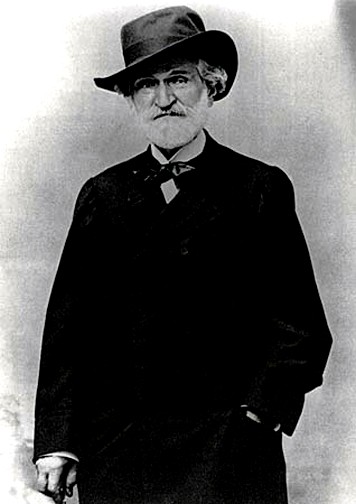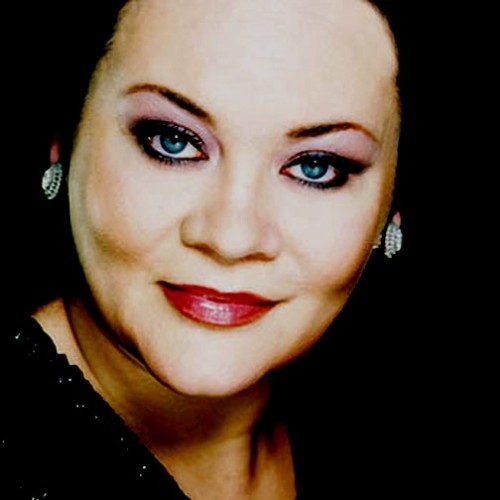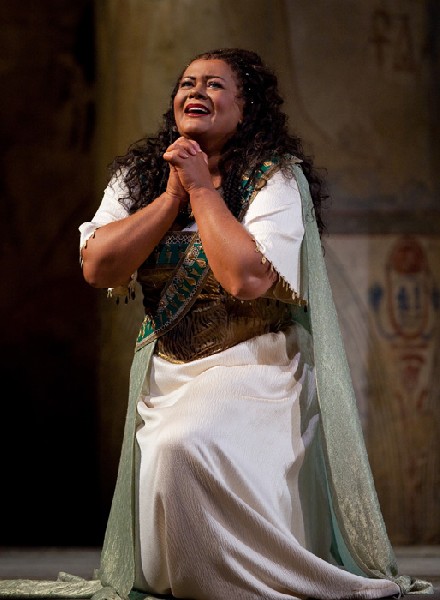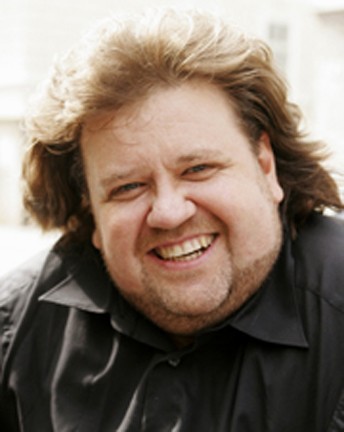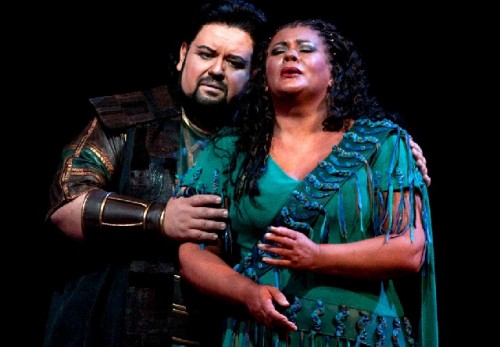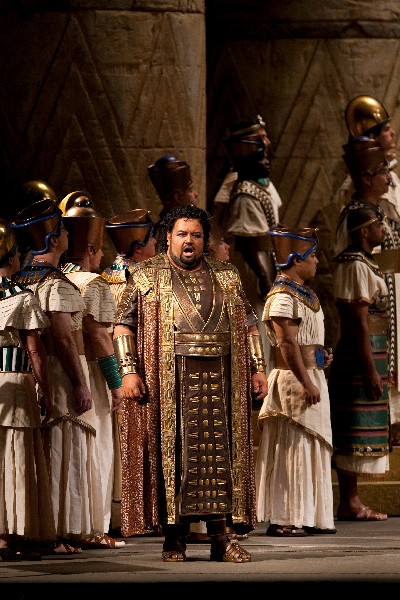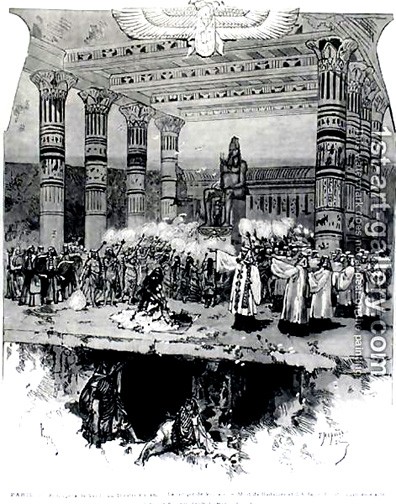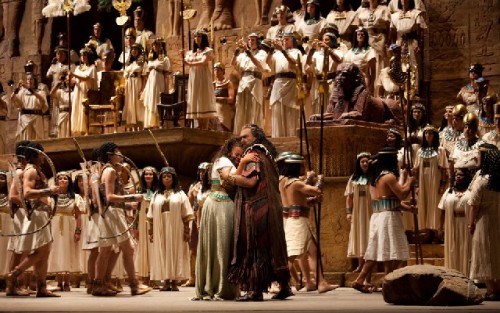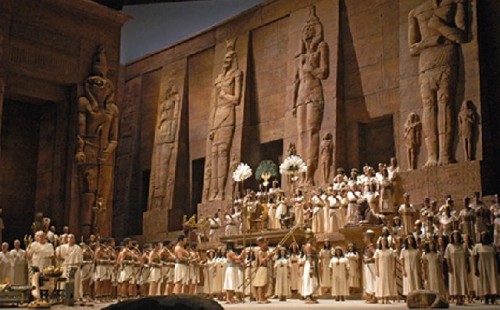Aida by Giuseppe Verdi Premieres at the Metropolitan Opera House
Live in HD Broadcast Set for October 24
By: Susan Hall - Oct 05, 2009
AIDA
Metropolitan Opera House
New York City
October 2, 2009
Cast: Aida Violeta Urmana. Amneris Dolora Zajick, Radames Johan Botha
Conductor, Daniele Gatti
Aida made its season premier on October 2 at the Metropolitan Opera House in New York. Audiences worldwide have rushed to attend Aida since its premier. This enthusiastic response gives off an aura of inevitability, concealing hard work, particularly the composer's unusual attention to every dramatic detail.
Powerful voices are in the cast. Violeta Urmana stars in the title role. In the lower register, Urmana's rich voice reveals its origin as a mezzo. Although there was a bit of strain at the top, the overall impression was of lustrous beauty.
Verdi's favorite soprano, Teresa Stoltz, who premiered the role at La Scala, performed both Aida and Amneris, Aida's rival for the love of Radames, the Egyptian military hero. La Stoltz occupied a prominent place in the Verdi household for several years, driving Mrs. Verdi crazy with worry about La Stoltz's charms.
Dolora Zajick's Amneris was gripping. Her range and power have made this dramatic mezzo-soprano the go-to performer for the role for over two decades. Zajick is often rightfully called a force of nature. As Radames, the burly South African tenor Johan Botha was intense and elegant.
Daniele Gatti conducted, creating beautiful context as he induced luscious soft passages soaring to what Verdi called "a whiff of the Marseillaise", the patriotic anthem, which ends the Introduction and Act II. When Aida was composed, the role of conductor was changing. Earlier, the composer would conduct the first three performances of the work and then step aside for a nameless person to continue, copying the composer's intentions.
As orchestrations became more complex, and conducting a profession, Verdi's selection of just the right person for Aida was a problem. The preferred choice, Angelo Mariani, had seduced La Stoltz, but refused to marry her. Although Verdi wanted him to conduct, friends suggested that this would be a betrayal of La Stoltz, so Verdi used Giovanni Bottesini instead. Interestingly, Verdi had a right to cancel the production right up through the dress rehearsals. With a living composer, objections were often raised that the conductor was treating the work as though it were his own.
Certainly in the case of Aida Verdi's involvement was a blessing. In no opera were his ideas and taste more completely implicated. His talent for drama is revealed recitative to aria, scene-to-scene, act-to-act. Verdi may have dished up something for everyone, but as one critic said, the work is so carefully built that only the flower remains, the stem having disappeared altogether.
Verdi wrote the librettist Antonio Ghislanzoni that he wanted to avoid a conventional death scene as Aida and Radames are sealed into the tomb. None of the struggle with life or protest of Il Trovatore. No, the librettist was to avoid words like: "My senses fail me. I go on before youÂ… Wait for me. She is dead. ! And I still live, etc. etc." "I want something," Verdi wrote, "sweet ethereal, a quiet, short duet, a farewell to life. Aida should then sink quietly into Radames' arms. Meanwhile Amneris, kneeling above the stone sealing the tomb, should sing 'Requiescat in pace', etc."
The Wagnerian heft of the three principals reminds us of the problems Verdi had after the first performances of Aida. Critics, influenced by Wagner's supporters, charged Verdi with imitating Wagner -- symphonic drama had arrived in opera and the smooth blending of recitative and aria in Aida,was, critics said, Verdi imitating Wagner. Verdi wrote, "After thirty five years of work, I am now an imitator!"
Here's how the confusion arose. In Wagner, the melodies are never to end and sometimes actually die in the singer and go on to the orchestra. This never happens in Verdi. The singer always dominates the orchestra. But Verdi wanted the musical line to continue throughout the opera and used a recitative leading into an aria to do this.
The recitative sometimes had four tunes, a melodic challenge to which Verdi always rose, but its tone and message were often in emotional contrast to the aria. A simple example is the recitative, which precedes "Celeste Aida" in the Introduction. Military in tone to reflect Radames as warrior, this recitative ends with the trumpet. The beloved aria that follows is lyrical and tender, revealing Radames love for Aida. Verdi's and Wagner's continuous melodies are composed very differently. No imitator, Mr. Verdi!
The sets in this production are drop dead gorgeous—temples and pyramids abound. Radio City pageants have clearly taken a page from Aida's book, riders on real horses lead the triumphal march and Radames the hero drives a chariot pulled by two gleaming white stallions. Soon general manager Gelb will channel Hannibal and figure out how to get elephants on the stage-- mighty productions of the opera in Egypt and Rome have featured them (as of course did Hannibal's campaign in the Italian Alps where he'd managed to bring his elephant troops from North Africa). The Met reports that they already use every lift in the house to mount this Aida.
The HD broadcast of Aida is scheduled for October 24th with the same cast. The brilliant Gary Halvorsan will direct, his cameras beautifully synced to the musical line and story. Whether Halvorson will choose the Cecil B. de Mille route remains to be seen. Will he convey the huge settings of the opera and its pageantry? Or take the frame of the screen, about the same size as the old twenty foot stage at the Amato Opera house in lower Manhattan, where the opera was also successfully produced?
He'll probably take a middle route, conveying both the majesty and the intimacy of the human drama -- the patriotic pull on one hand and human love on the other. In any case, the three principals sing with riveting glory and the static stage direction at the Met will succumb to the sheer beauty of the music and the intense drama. Bravo HDs.

